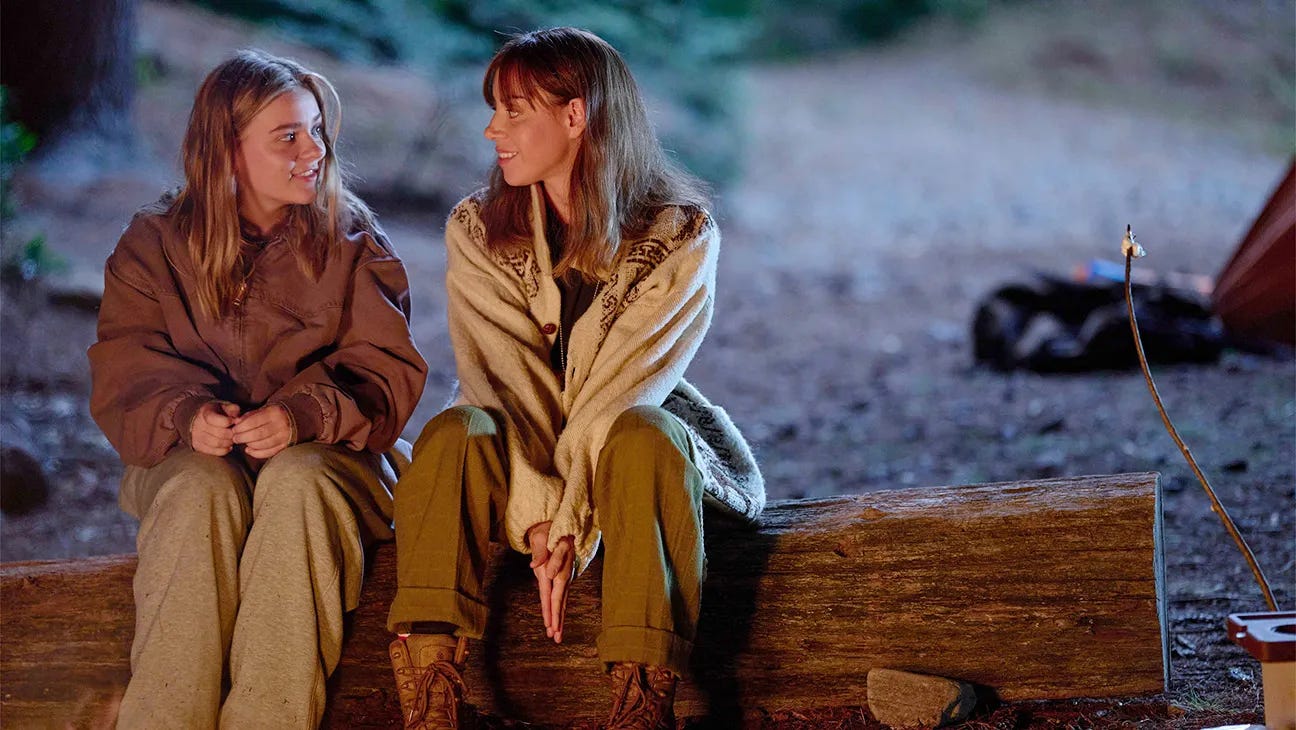MY OLD ASS Is A Story About Being True to Yourself Which Isn’t
Also not enough Aubrey Plaza
Megan Park’s My Old Ass starts with a clever magical realist twist courtesy of Aubrey Plaza, and then largely abandons it and her for a more conventional coming of age narrative. By not committing to its best idea, it makes that idea feel like a gimmick, undermining the emotional power of the film—not least by sidestepping the story’s queer resonances.
The person who is coming of age here is Elliott (Maisy Stella). Elliott is approaching her 18th birthday, soon to be followed by her departure from her family’s cranberry farm for college in Toronto. Elliott celebrates her oncoming adulthood by first hooking up with a hot girl she’s been flirting with since eighth grade, and then by taking shrooms with her friends. During her mushroom trip she has a vision of her future self (Aubrey Plaza). Future Elliott warns young Elliott to wear her retainer so she doesn’t get a gap in her teeth, to spend more quality time with her mom and siblings, and to stay away from some guy named Chad.
Old Elliott departs with the end of the hallucination, but keeps in touch with young Elliott intermittently by phone. The focus of the film quickly shifts away from the future, and towards the present, where Elliott feels a growing attraction to that Chad guy (Percy Hynes White ), a charming ectomorph working on Elliott’s family’s farm for the summer.
Elliott’s leery of Chad in part because her older self told her to be. But she’s also leery, we eventually learn, because she’s always thought she was a lesbian and has built her identity around her queerness. Her attraction to Chad makes her question whether she was who she thought she was, or whether she is still the same person she used to be. Coming out, or finding who you love, splits the (queer) self between past and present, the one who didn’t know and the one who will know. Which is why Elliott ends up texting with her old ass.
Bifurcated identity and time travel are themes in a good bit of queer fiction (see David Gerrold’s The Man Who Folded Himself as one example.) My Old Ass, though, isn’t willing to think through that metaphor, nor to let queerness serve as the focus of a story that is pretty clearly about queer identity. Elliott’s uncertainty about who she is and who she loves is downplayed in favor of frankly manipulative half revelations about Chad’s potential dangers as a significant other. The final plot complication feels manipulative and cheap; an unnecessary tear jerker ending brought in to justify a lot of unnecessary shilly-shallying.
I want to be clear that the problem is not that Elliott is bi, or that she ends up with a guy. Bi people exist and are queer, and their heterosexual relationships don’t invalidate them. It’s refreshing to see that stated so clearly on screen.
But if that’s the point of the film (and it’s a good point!), then why not make it the point of the film? Why not give some more screen time to Elliott’s relationship with her crush—a woman who barely gets a line in the movie film? Why do we only find out two thirds of the way through the movie—after Elliott and Chad have kissed!—that Elliott initially considers herself lesbian, not bi?
Elliott’s life is changing; she’s moving from the farm, she’s leaving her parents, she’s leaving her friends. Time is taking her on. But My Old Ass spends most of its 90 minutes distracting you from, and even refusing to tell you about, one of the big ways in which Elliott is changing. Even Aubrey Plaza can’t save a film that doesn’t seem to want to be itself.



This reads like a good and discriminating analysis of a disappointing film.
I am left wondering who was responsible for making these disappointing shifts in plot and focus.
Author, producer, screenwriter, Director?
Leave ‘em wondering, just don’t leave me wondering…